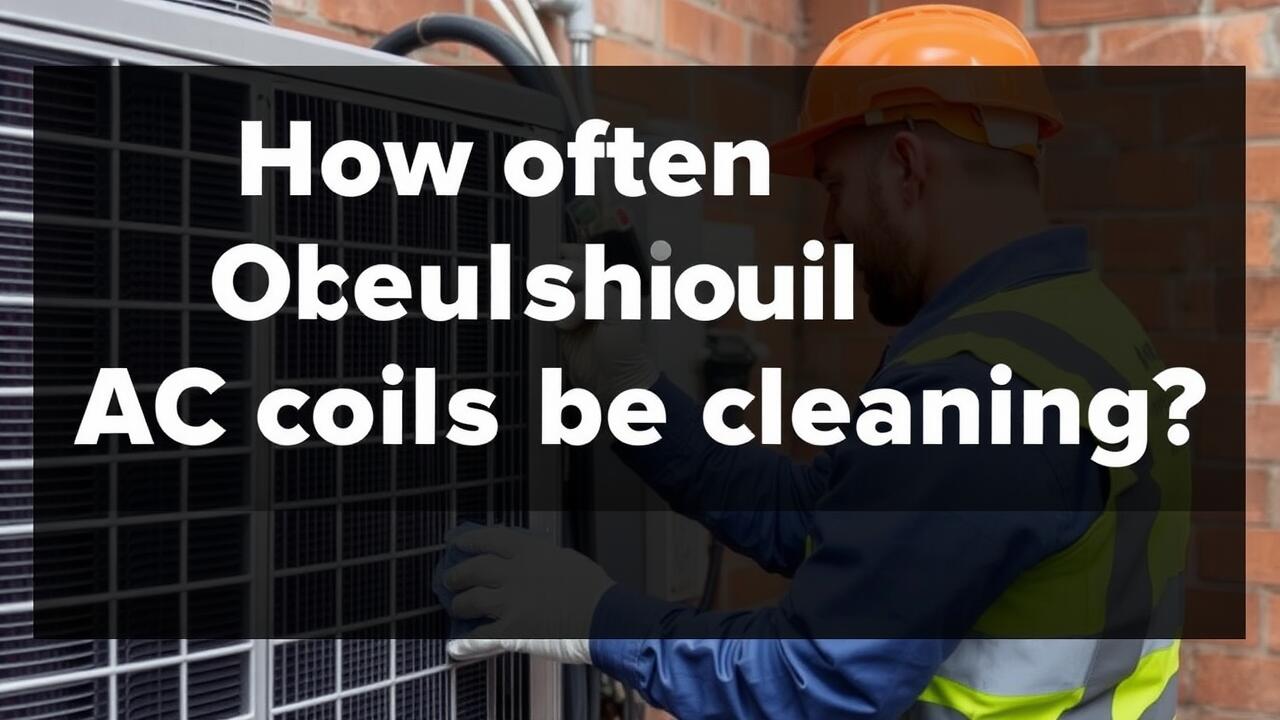How often should AC coils be cleaned?

Table Of Contents
Professional vs. DIY Coil Cleaning
When it comes to cleaning AC coils, homeowners often face the dilemma of whether to tackle the task themselves or hire a professional. DIY coil cleaning can be a cost-effective solution for those with a bit of technical know-how and the right tools. Basic tasks might include vacuuming away dust and debris or using a gentle spray of water to remove surface grime. However, it's vital to ensure that no damage occurs to the delicate fins during this process.
On the other hand, professional cleaning services possess the expertise and equipment necessary to thoroughly clean and maintain coil systems. Technicians are trained to handle various types of coils and can identify underlying issues that might not be evident to an untrained eye. They also have access to specialized cleaning agents and tools that can ensure a more effective cleaning without risking damage to the system.
When to Call a Technician
Recognizing when to seek professional help for AC coil cleaning can save both time and money. If you notice a significant drop in the cooling efficiency of your air conditioning system, it's a sign that dirt and debris may have built up on the coils. In addition to performance issues, strange noises or unusual odors emanating from your unit could indicate deeper problems requiring expert attention.
Another reason to call in a technician is the frequency of cleaning needed. If your equipment has not been cleaned professionally in over a year, it's wise to schedule a service. Technicians have specialized tools and knowledge to access hard-to-reach areas and ensure thorough cleaning, which is often difficult to achieve through DIY methods. Regular professional maintenance bolsters the longevity and efficiency of your HVAC system.
Preventative Maintenance Tips
Regular maintenance of AC coils can significantly enhance system performance. Utilize a soft brush or vacuum attachment to gently remove dust and debris from the coil surface. Cleaning the coils at least once a year is advisable, especially before the cooling season begins. Keeping the surrounding area free of debris is also essential, as leaves and dirt can obstruct airflow, leading to inefficiency.
Monitoring the humidity levels in your environment can help prevent coil corrosion. Installing a dehumidifier can mitigate moisture build-up, which may protect your coils over time. Additionally, inspecting the insulation on refrigerant lines is crucial, as any wear can lead to energy loss. Implementing these simple preventative measures will contribute to the longevity and efficiency of your air conditioning system.
Best Practices for Coil Care
Regular inspections of AC coils play a vital role in maintaining their efficiency. Identify any dirt or debris buildup early to prevent future performance issues. Utilize a soft brush or low-pressure water to carefully remove any contaminants. When cleaning, be cautious to avoid damaging the coils. A routine cleaning schedule is essential, especially in dusty environments or during peak usage seasons.
Incorporating a preventative maintenance plan can extend the lifespan of your air conditioning system. Schedule professional cleanings at least once a year, depending on usage levels and environmental factors. Regular filter changes also contribute to coil health by minimizing dust circulation. Keeping surrounding areas free of obstructions allows optimal airflow around the unit, promoting better efficiency and reducing wear on the coils.
Consequences of Neglecting Coil Maintenance
Ignoring the maintenance of AC coils can lead to a range of issues that compromise the efficiency and longevity of your cooling system. When dust and debris accumulate on the coils, it hampers heat exchange, forcing the system to work harder. This increased workload often results in higher energy consumption, leading to inflated utility bills. Additionally, strain on the components may cause premature wear and tear, necessitating costly repairs or even a complete system replacement.
Beyond just energy inefficiency, neglecting coil cleaning can trigger more severe operational problems. A buildup of dirt can lead to overheating, which might damage the compressor and other integral parts. Furthermore, moisture retention due to dirty coils can encourage mold growth, posing health risks to occupants and leading to diminished indoor air quality. Proactive maintenance helps avoid these complications and ensures the AC system operates smoothly.
Potential System Damage
Neglecting to clean AC coils can lead to a host of serious problems that can compromise the efficiency and functionality of the system. Dirty coils hinder heat exchange, forcing the unit to work harder to maintain desired indoor temperatures. This increased strain can result in higher energy bills as the system struggles to perform optimally.
In addition to rising operational costs, accumulation of dirt and debris on coils can cause overheating, which may damage sensitive components within the air conditioning unit. Prolonged neglect may even lead to complete system failure, necessitating expensive repairs or a full system replacement. Regular maintenance is essential to avoid these costly repercussions and to ensure the longevity of your air conditioning system.
FAQS
How often should AC coils be cleaned?
AC coils should typically be cleaned at least once a year, but depending on environmental factors and usage, more frequent cleaning may be necessary.
What are the signs that my AC coils need cleaning?
Signs that your AC coils need cleaning include reduced cooling efficiency, increased energy bills, and visible dirt or debris on the coils.
Can I clean the AC coils myself?
Yes, you can clean the AC coils yourself using a soft brush or vacuum, but it’s often recommended to call a professional for a thorough cleaning, especially for complex systems.
What is the difference between professional and DIY coil cleaning?
Professional cleaning typically involves specialized equipment and techniques that ensure a deeper clean without damaging the coils, while DIY methods may not remove all debris and can risk damaging the system.
What happens if I neglect my AC coil maintenance?
Neglecting coil maintenance can lead to reduced efficiency, higher energy costs, and potential damage to the air conditioning system, which may require expensive repairs.